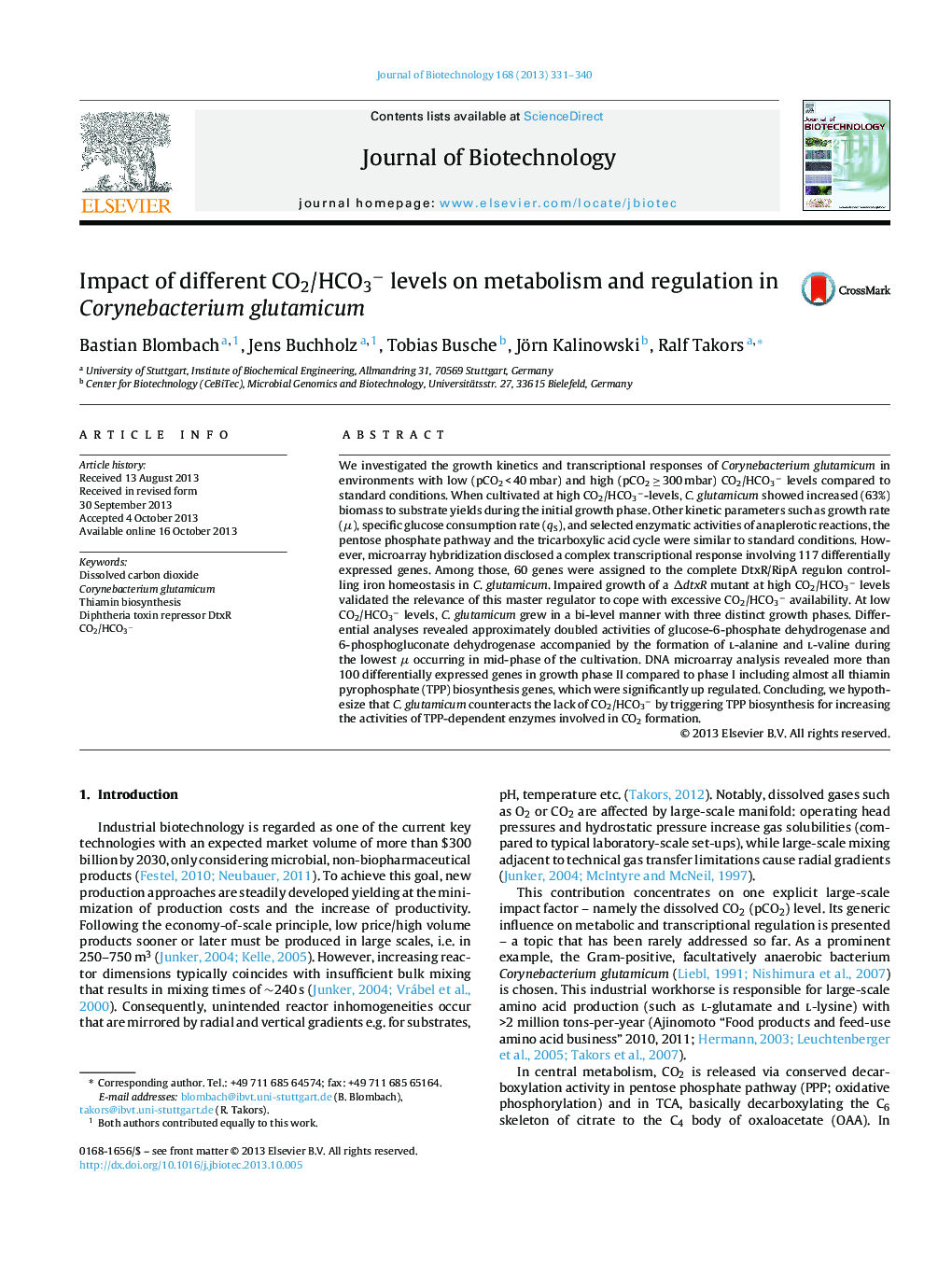| کد مقاله | کد نشریه | سال انتشار | مقاله انگلیسی | نسخه تمام متن |
|---|---|---|---|---|
| 6491659 | 43436 | 2013 | 10 صفحه PDF | دانلود رایگان |
عنوان انگلیسی مقاله ISI
Impact of different CO2/HCO3â levels on metabolism and regulation in Corynebacterium glutamicum
دانلود مقاله + سفارش ترجمه
دانلود مقاله ISI انگلیسی
رایگان برای ایرانیان
کلمات کلیدی
موضوعات مرتبط
مهندسی و علوم پایه
مهندسی شیمی
بیو مهندسی (مهندسی زیستی)
پیش نمایش صفحه اول مقاله

چکیده انگلیسی
We investigated the growth kinetics and transcriptional responses of Corynebacterium glutamicum in environments with low (pCO2 < 40 mbar) and high (pCO2 â¥Â 300 mbar) CO2/HCO3â levels compared to standard conditions. When cultivated at high CO2/HCO3â-levels, C. glutamicum showed increased (63%) biomass to substrate yields during the initial growth phase. Other kinetic parameters such as growth rate (μ), specific glucose consumption rate (qS), and selected enzymatic activities of anaplerotic reactions, the pentose phosphate pathway and the tricarboxylic acid cycle were similar to standard conditions. However, microarray hybridization disclosed a complex transcriptional response involving 117 differentially expressed genes. Among those, 60 genes were assigned to the complete DtxR/RipA regulon controlling iron homeostasis in C. glutamicum. Impaired growth of a ÎdtxR mutant at high CO2/HCO3â levels validated the relevance of this master regulator to cope with excessive CO2/HCO3â availability. At low CO2/HCO3â levels, C. glutamicum grew in a bi-level manner with three distinct growth phases. Differential analyses revealed approximately doubled activities of glucose-6-phosphate dehydrogenase and 6-phosphogluconate dehydrogenase accompanied by the formation of l-alanine and l-valine during the lowest μ occurring in mid-phase of the cultivation. DNA microarray analysis revealed more than 100 differentially expressed genes in growth phase II compared to phase I including almost all thiamin pyrophosphate (TPP) biosynthesis genes, which were significantly up regulated. Concluding, we hypothesize that C. glutamicum counteracts the lack of CO2/HCO3â by triggering TPP biosynthesis for increasing the activities of TPP-dependent enzymes involved in CO2 formation.
ناشر
Database: Elsevier - ScienceDirect (ساینس دایرکت)
Journal: Journal of Biotechnology - Volume 168, Issue 4, December 2013, Pages 331-340
Journal: Journal of Biotechnology - Volume 168, Issue 4, December 2013, Pages 331-340
نویسندگان
Bastian Blombach, Jens Buchholz, Tobias Busche, Jörn Kalinowski, Ralf Takors,